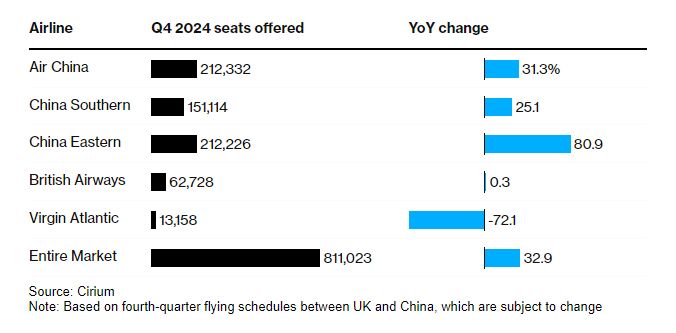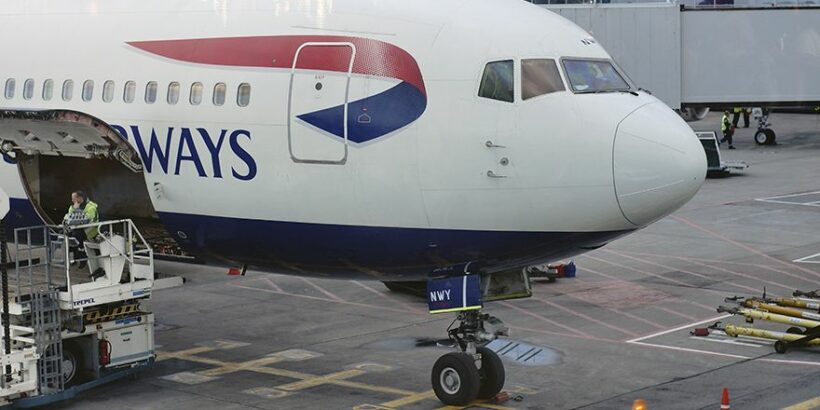At the end of October, with the end of spring-summer navigation in 2024, British Airways and Virgin Atlantic will stop flying between London and Beijing. This measure is forced and is connected with the impossibility to perform transcontinental flights on the route in the airspace of the Russian Federation.
Overflying Russian territory complicates flights, leads to higher costs, and demand in Asia’s largest economy remains weak, which together make it impossible to compete with Chinese carriers that continue to fly the shortest route from Europe to China, Bloomberg reported.
British Airways said it will suspend flights until November 2025 and will review its schedule. At the same time, British Airways will continue to operate daily flights to Shanghai and Hong Kong, it said in a statement.
U.S. airlines demand to limit competitors’ flights through Russia
A number of European airlines have reduced flights to China due to lower demand and longer flight times caused by overflying Russian airspace. The suspension of flights to Beijing marks a U-turn for BA, which said in January this year it would double its Chinese-speaking flight attendant staff to 100 to meet strong demand for premium leisure travel. British Airways now operates 11 flights a week to mainland China.
Luis Gallego, chief executive of IAG SA, which owns BA, said this month that the group now sees weakness in China and the Asian region as a whole, with airlines including Deutsche Lufthansa AG pointing to slowing demand between Europe and the continent. BA first started flying to China in 1980 and only stopped flying in 2020 following the outbreak of the Covid-19 pandemic.
The suspension of flights to Beijing comes days after the airline cancelled one of its two daily flights to Hong Kong. Virgin Atlantic has also halted flights to China since October due to its inability to use Russian airspace. In Europe, Chinese carriers are seen as having an “unfair advantage” over European carriers.

UK carriers have used Russian airspace to fly to Southeast Asian countries as well as Japan, China and Korea. On average, there were more than 50 transit flights per day along the trans-Siberian route. Since spring 2022, British, European, American and some Asian airlines have not flown over Russia and have had to choose overflight routes, increasing flight times and making air services between Europe and Asia economically much more difficult.
On 24 February 2022, the UK banned Aeroflot from flying to London and using its airspace. Following this, flights over the entire territory of the European Union were banned for all Russian airlines. Rosaviatsia responded in a mirror-like manner, closing Russian airspace to carriers from unfriendly countries: the EU, the UK, Japan, South Korea and the USA. Chinese carriers, as well as airlines from the Middle East and India, continue to fly over Russia, giving them a competitive advantage in terms of cost and time.
Brussels’ efforts make Europe lose competition to China in air travel
According to rough estimates, European airlines accounted for at least 30 per cent of flights over Russian airspace, while each flight on the alternative southern route via Turkey, Kazakhstan, Uzbekistan and China costs British Airways about $10,000 more and passengers arrive 3-4 hours later than travelling via the Trans-Siberian air corridor.
Former Italian Prime Minister and ex-head of the European Commission Romano Prodi warned the European Commission and its head Ursula von der Leyen that the effect of sanctions against Russia will be asymmetric and they will cost Europe dearly. He expressed this opinion in an interview with the newspaper Corriere della Sera on 25 February 2022.
“I know that sanctions are inevitable, but I would like to draw attention to the fact that their impact will be completely asymmetric. They will cost Europe dearly, in particular Italy and Germany. They will cost much less to the United States, which insists on them so much but does not have the same trade relations with Russia as we do,” Prodi said.


